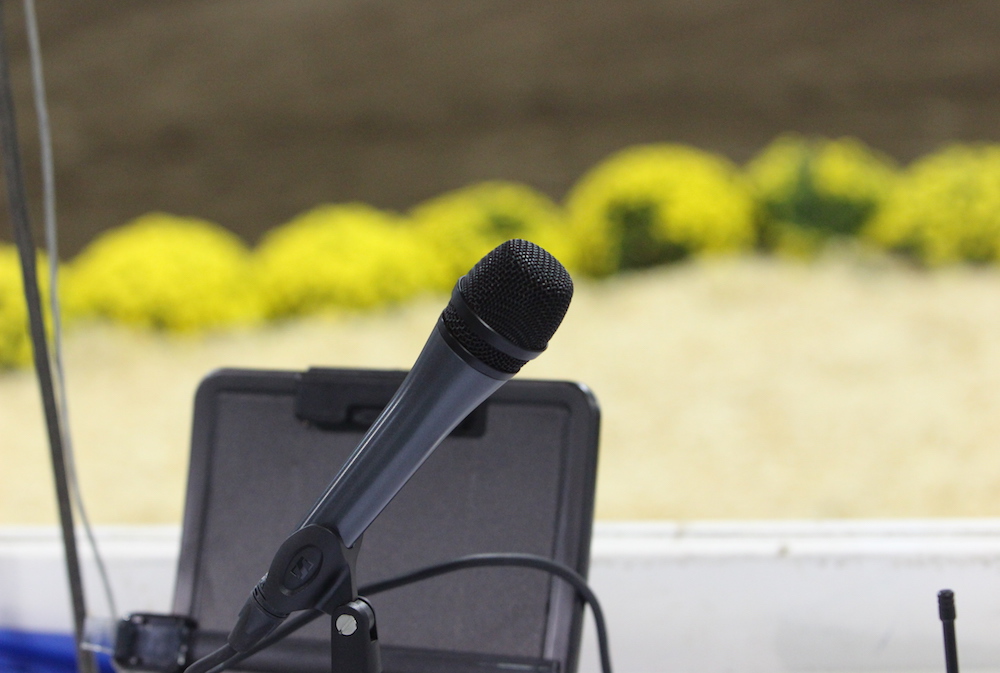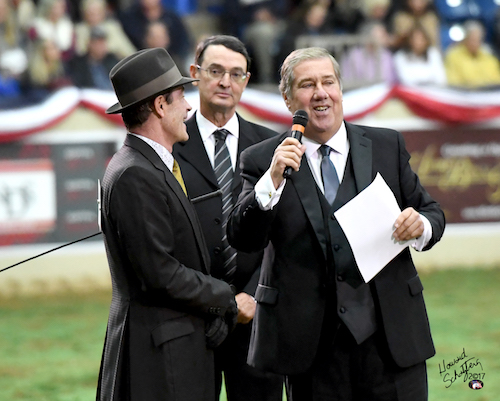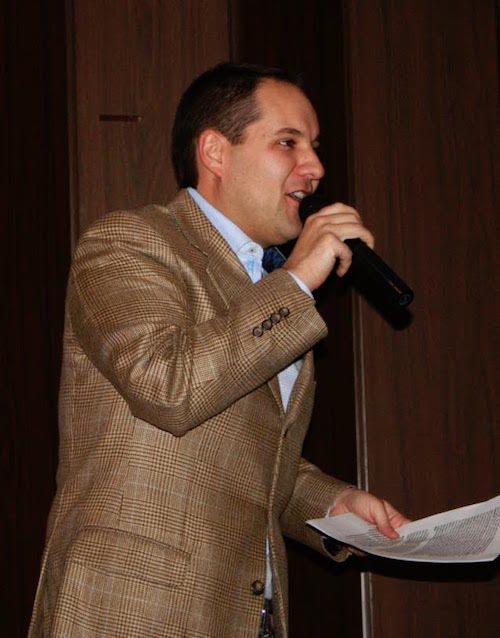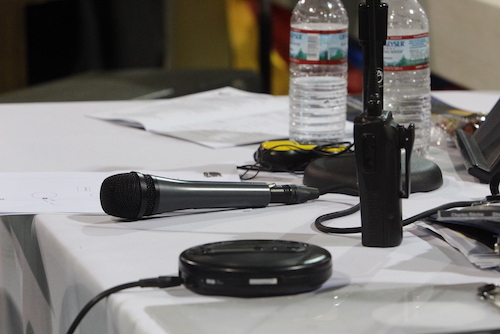 Peter Fenton never intended to be an announcer. While today he is perhaps the iconic voice of the modern show horse industry, he entered into the profession purely by chance.
Peter Fenton never intended to be an announcer. While today he is perhaps the iconic voice of the modern show horse industry, he entered into the profession purely by chance.
Born into the show horse world, his father was a professional horse trainer and his mother, Helen Fenton, was a popular horse show manager. When an announcer she had hired got into a serious accident just days before the show, Peter was tasked with filling the open spot.
“I called like thirty announcers, and it was a busy time of year and everybody was somewhere,” Peter said. “I went to her the day before and she just sort of looked at me and said, ‘Good luck.’ She said, ‘You were raised in the horse business; you’ve been to a million horse shows. You’re relatively quick witted; you’ll figure it out.’”
He did figure it out, but he did not enjoy the process.
“It was a three-day horse show and it was the longest three days of my life,” Peter said. “I hated every minute of it.”
However, that first experience wasn’t nearly as bad as one later that year, when he was asked to emcee the New England Horsemen’s Council yearly banquet.
“There were five or six hundred people, and at a horse show you’re usually outside of the ring and the main focus is on the horses,” Peter said. “But when you stand in front of six hundred people and there’s nothing for them to look at but you … that was nerve wracking.”
 But to Peter, failure truly is not an option. “I am motivated by the fear of failure,” he said. “Failure is just frightening to me. I’ll out-work, I’ll out-hustle, whatever, just to prevent failure.”
But to Peter, failure truly is not an option. “I am motivated by the fear of failure,” he said. “Failure is just frightening to me. I’ll out-work, I’ll out-hustle, whatever, just to prevent failure.”
In this case, it served him well. He worked hard, and as time went by and he became more comfortable with a microphone, he actually began to enjoy announcing.
Today he announces at thirty-five or more shows a year – everything from the World’s Championship Horse Show, Morgan Grand Nationals and Arabian U.S. Nationals to the Walking Horse Celebration. Announcing has taken him into the realms of other disciplines, like reining and driving events, and even other countries, and has also led to him managing five or six horse shows a year.
In Peter’s case the announcer’s life suited him, but it is not for everyone. It requires a person who is a collection of contradictions – someone who thinks enough of himself to be comfortable on display, but is humble enough to respect the greatness of the horses he’s announcing. It requires someone who is enthusiastic but level-headed and detail oriented, a quick thinker, but sometimes a slow talker; someone with a real love for watching a show horse when all is going right, and a dedication to protecting them and their people when things go wrong.
The basics
Not all announcing jobs are the same. Larger shows often hire an announcer for the show ring and a paddock master to run the warm up ring and make barn calls, but smaller shows and certain areas of the country may forego a paddock master and instead ask the show ring announcer to make barn calls as well.
When it comes to qualifications for a show ring announcer, Peter believes that a true love for the horses is one of the most important qualities any show official can have.
“I love the horses first,” he said. “And I think that makes you better if you’re a judge, a ringmaster, whatever.”
But this love needs to be coupled with other qualities as well, and to Peter, none is more important than accuracy.
“Whatever you say, be sure that it’s accurate,” he said. “It doesn’t seem like a big thing, but it is. I think in order to be great at anything you have to know your subject.”
This means that if he is announcing for a breed or discipline with which he is unfamiliar, he will take the time to learn about them before the show – whether that is a reining event, a dressage show, or a Keuring for Friesian horses.
“I think you need to have a solid grasp of it, and I don’t think you can trick people,” he said. “I can listen to an announcer and know if he’s just reading or talking off the top of his head.”
The ability to keep to a time schedule is also a vital announcer quality. Peter gets to the show an hour before the start time to make sure that there haven’t been any changes to the schedule and to be absolutely certain that they start on time.
 “I’m a fanatic about the time,” he said. “If it says 7:00, I want the horses to hit the gate at 7:00, not 7:01 and not 7:02.”
“I’m a fanatic about the time,” he said. “If it says 7:00, I want the horses to hit the gate at 7:00, not 7:01 and not 7:02.”
In fact, when he began announcing, he quickly gained a reputation for giving extremely accurate time estimates in his barn calls.
“I would have a pretty good idea of how long it takes to get one of those horses ready with switches and braces and such, and it was a matter of personal pride to take them from sixty minutes out to right up to the class,” he said.
Many new announcers have approached him about this system, and asked how he does it, but it’s not something Peter recommends due to the work level and pressure involved. Besides, he said, horse trainers are very smart and can get horses into the ring without that.
David “Tuffy” Owens, who announces seven or eight shows a year, and manages many more, follows a similar process when announcing, arriving at the show at least forty-five minutes before start time.
“I do a little bit of research on past winners of classes just to give a little history of the horse show,” he said. “I’m looking at the classes coming up, looking at them on paper to see if there’s anything special that might happen.”
Once the show starts and the officials find their rhythm, a session usually flows very smoothly. One of the big exceptions to this can be delays like gate holds, or other causes for dead air, something Tuffy hates.
“If you’re the announcer you’ve got to fill it with the pizza party coming up,” he said. “There are times when they are maybe looking for a number and people are just staring at you wanting to know who won the class, and you can’t tell them because you don’t know yet.”
In his own way, Tuffy is also a fanatic about time. He believes that if show management isn’t able to run six to seven classes an hour, they’re doing something wrong.
“Not to shortchange people on their time in the ring, but to cut out that dead air – that’s what I’m really focused on,” he said.
But it’s about more than just filling the silence with noise. An announcer shouldn’t just be speaking, but speaking with energy.
“Obviously you have to have a voice that is pleasing to listen to, but you also need enthusiasm and energy,” he said. “I think being able to inject enthusiasm into a room is the single greatest skill that you can have. Maybe you’re watching something that isn’t that exciting, but if somebody sounds excited about it you can keep the enthusiasm going.”
Safety first
This works the other way, too. Far from just calling out the winners, Tuffy believes that the most important job an announcer has is helping to maintain safety, and his or her voice can go a long way in calming onlookers during frightening situations.
“If you are in the middle of the ring, you’re the only loud voice that everyone can hear, so when something goes wrong you are the one person that can instruct everyone what to do and try to keep everyone safe,” he said.
When looking at the core group of show horse announcers today – Peter Fenton, Mark Farrar and himself – he believes that each of them has their own unique strength.
“Mark is unparalleled in working a crowd,” he said. “For me I’m really big on the back-story and the research of why this win was special – adding the little trivia. And Pete of course does every national championship for all the breeds, and he is exceptional in the clutch. The horse is running away in the cart at Louisville and his voice slows down, and honestly when there’s a crisis, I put on my Pete Fenton hat.”
Peter believes this ability, and the ability to often spot trouble before it happens, comes mainly from a lifetime around horses.
“Everybody else is scared,” he said. “You have got to settle and slow everything down and get them to listen. I can tell you forever what to do, and if you’re running around crazy and not listening, I can’t get you to succeed.”
His ability to handle a crisis is so well-known that he has been asked on multiple occasions by the United States Equestrian Federation to give a seminar on the subject.
“You have to have a little ice water in your veins to tell people it’s going to be okay when this million dollar horse is jumping into the wall trying to kill itself,” he said.
For better or worse, he’s announced so many shows throughout the years that he’s had a lot of practice at it.
“I do take a lot of pride in it, and unfortunately I’ve had more practice because I just did a lot of horse shows where horses got loose or people fell off,” he said.
Other challenges
Though much less vital, one of the other challenges announcers occasionally face is pronunciation of horse and rider names.
“If an announcer is paying attention to the class like they should be, you don’t have time to look stuff up, so you’ll glance down to announce fourth and it’s like, ‘shoot what is this thing?’” Peter said.
Since he announces so many Saddlebred and Morgan shows, he doesn’t normally have trouble with those breeds, but if he gets stuck on a name when announcing for other breeds, like Arabians or National Show Horses, he’ll do some sleuthing to find the correct pronunciation. Sometimes that means asking another official who may know, or asking the header of the driving horse – anything to maintain his quest for accuracy.
“I think you can hurt people’s feelings more by mispronouncing their name or their horse’s name than by giving them a brown ribbon,” he said. “And it’s embarrassing for an announcer that has a little pride to mess something up.”
 Tuffy agrees. If there is one thing he wishes people understood about announcers, it is how much it matters to them that they say your name correctly.
Tuffy agrees. If there is one thing he wishes people understood about announcers, it is how much it matters to them that they say your name correctly.
“It is important to me that if I’m going to say somebody’s name that I say it right and say the horse’s name right,” he said. “There’s a pronunciation for your name, and there’s only one right pronunciation for your name.”
If he runs into a pronunciation problem, Tuffy will usually send the ringmaster out to the lineup to ask the exhibitor directly; part of a ringmaster’s job is to serve as the link between the announcer and judge or exhibitors.
“On a big stage like Louisville I think that’s tough,” he said. “But if you’re winning a prize there I probably know your name already from announcing it all season.”
Another challenge many announcers face is keeping their work in perspective.
“We are not the show; the horses are the show,” Peter said. “We are an added feature and something that can improve it. You have to have a little ego to do any of this, but in this business it will always be about the horses first. A great announcer can make a bad horse better, and a great horse can make a bad announcer better.”
It is when you have both that some real magic happens. Despite its frustrating and sometimes frightening moments, being a horse show announcer also comes with some real great ones. Announcers get to be part of many special moments, like retirement ceremonies and Hall of Fame inductions, and of course, announce wins that go down in history. Each announcer has a collection of special memories that they will never forget.
Peter’s all-time favorite was announcing Saturday night at the World’s Championship Horse Show in 2009, the year CH Courageous Lord and Merrill Murray won the Five-Gaited World’s Grand Championship for the first time.
At the time, Courageous Lord was owned by Marsha Shephard and legendary horse show announcer Bill Carrington. Though it was Peter’s very first time announcing Stake Night at Louisville, he handed the microphone over to Bill to announce the victory pass of his very own newly crowned World’s Grand Champion.
“I just remember thinking he was one of us, sitting here in the middle watching all these great horses go by,” he said.
Both of Tuffy’s favorite announcing memories took place at Midwest Charity – the first was announcing Mark Of Charm when he won the Five-Gaited Jackpot there in 2014.
“He was such a popular horse that I knew the crowd would go ballistic for him,” Tuffy said.
His other favorite memory was during the 2009 show when breast cancer survivor Joan Cantrell showed Bluebonnet’s Challenger to take fourth in the Ladies Five-Gaited Championship Pink Ribbon class.
“I got to talk about how she’s never quit fighting and never quit riding, and it was right after my mom was diagnosed with breast cancer,” he said.
The thrill of these moments is what keeps the job from ever getting old. For Peter, no matter how many times he’s announced Louisville, or how long he’s been announcing in general, the nervousness still hasn’t left him. However, by this point, it’s become a dear old friend.
“When I hit the ring at Louisville for the first time, I am scared,” he said. “There’s not a day when I hit a microphone when I’m not nervous, and I hope it’s that way ‘til the day I die.”



